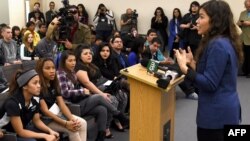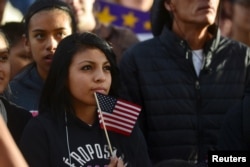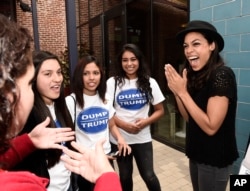The Latino population has grown into the largest minority group in the United States, a transformation that makes this voting bloc increasingly influential in this November's presidential election.
Latinos comprise more than 17 percent of the total U.S. population, according to the Pew Research Center, and U.S. Census figures project that number to reach 28.6 percent by 2060.
Growing population
“They’re growing, growing fast,” Jens Manuel Krogstad, a Pew Research Center expert who focuses on Hispanics, immigration and demographic, told VOA.
The latest U.S. presidential election clearly shows the importance of the Latino vote in the race for the White House, said Gerver Torres, a Latin America specialist at Gallup Consulting. “Hispanics in the United States have an increasing importance and their weight is even more significant in some states with higher numbers of Latinos."
Barack Obama received approximately 72 percent of the Hispanic vote in the last presidential election, according to Pew. This statistic and other data in this election cycle prove, “the Hispanic vote will heavily concentrate around a Democratic candidate,” said Torres.
According to Gallup, Democratic presidential front-runner Hillary Clinton enjoys a more than 60 percent preference among Latinos, while presumptive Republican presidential candidate Donald Trump is preferred by 14 percent of Latinos.
Power of Hispanic vote
The Gallup statistics alone do not mean the Latino vote would have the impact it could have on the general election. According to Krogstad, geography could be a definitive factor in changing the tendency of the Latino electorate to not maximize its potential.
“Almost half of Latinos live only in two states: Texas and California. Those two states are generally not very competitive in the presidential elections,” he said.
Krogstad, however, added Florida, Nevada and Colorado are three states where the power of the Hispanic vote has the potential to determine who will become the next president.
Reality or myth, the numbers highlight the potential impact of the Latino vote on the presidential election: 27 million people of Latino origin are able to vote. That represents 12 percent of the total U.S. population, the same percentage represented by African Americans, said Krogstad.
Nevertheless, the challenge of increasing Latino voter participation remains. “Historically, the percentage of voting Latinos has been one of the lowest. Out of the potential 27 million Hispanic voters, only 46 percent actually cast their vote," Torres said.
Perceptions are important
As the Latino population becomes more educated, however, Torres said "it also becomes more civic-minded”.
Besides the generational differences among Hispanics, another factor is more evident today than in previous elections: Latino immigrants are becoming U.S. citizens in very high numbers.
“When Latino immigrants become naturalized U.S. citizens, they exercise their right to vote in higher proportions than U.S.-born Latinos,” according to Krogstad.
Since 2012, more than 1.2 million Hispanics have become U.S. citizens, and that could be a game changer in the election process.
“They tend to be more socially conservative. Hispanics born in America resemble more the beliefs held by the rest of the U.S. population," Krogstad said.
Six states have a Latino population of more than 15 percent: California, Colorado, Florida, Nevada, North Carolina and Texas. The presidential candidates are paying attention to those states, which experts say translate into many opportunities and challenges as well.
Is the Latino vote powerful enough to determine who wins the presidential election? The Heritage Foundation's Israel Ortega, who once worked as a Capitol Hill staffer, believes so, adding, "If this election is close, as many observers have pointed out, Nevada, for instance, a state with almost 20 percent of the Latino population eligible to vote, could determine the outcome of the election, undoubtedly.”
Another determining factor about the potential impact such demographics could have on the general election is the steady expansion of the pool of eligible Latino voters. Every year, 500,000 more U.S. citizens of Latino origin are able to cast their vote in the presidential elections.
Joseph Humire, executive director of the Center for a Secure Free Society, said statistics are only part of the equation.
“Reality does not necessarily deal only with statistics, but with perceptions," he said. "Politicians are realizing that the Hispanic vote is very important. It shows on the campaign trail. And that is no myth."
VOA Lina Correa contributed to this report.







